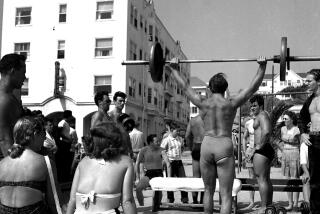Soviets Wary of Aerobics Buildup : New Arms--and Legs--Race Finds Foes Among Visitors
- Share via
Here’s an alternative definition of disarmament: It’s what happens to the limbs of citizens of the Soviet Union when they practice aerobics too vigorously.
Yes, the workout craze has traveled--far. And, yes, some Soviet physicians are worried that the pursuit of muscle tone may be dangerous to their public’s health.
Medical Establishment
In particular, that’s the opinion of Yuri P. Lisitsyn, a high-level member of the Soviet medical Establishment who’s currently touring that seedbed of fitness mania, California.
In an interview, Lisitsyn, who was in Los Angeles as part of an exchange program arranged by the Esalen Institute, labeled aerobics a “fad” that is spreading “like wildfire or an epidemic” in his country.
While lauding the urge to improve health and fitness, Lisitsyn said he is concerned that some of his countrymen are risking injury by stretching, bending and jumping too far, too fast and too high.
“If a fad becomes too extreme, it is harmful,” he said through an interpreter. “In my opinion, epidemics never lead to anything good. . . . What concerns me most is that graceful and slender and active teen-agers are doing aerobic exercises at an unbelievable tempo, which could be extremely harmful. And older people, who may not be capable (of these exercises) and for whom it is less appropriate to be engaged in these exercises, also are following this fad--and this is of grave concern.”
Lisitsyn, a member of the Academy of Medical Science and director of the Soviet Union’s largest medical publishing house, conceded that there is no scientific evidence to support his opinion, largely because the craze is too new to have developed a statistically significant casualty list. But he noted that a couple of years ago Russians took up running en masse, most of them without proper supervision, which produced many cases of overexertion or worse.
Jovially Chided
Lisitsyn’s position isn’t reflective of a monolithic medical attitude, however. In the same interview, he was jovially chided by one of his colleagues in the delegation.
Dr. Alexander Vishnevsky, deputy director of a surgical institute and head of national research in lung surgery, said, “I feel that Professor Lisitsyn has talked about this in a very pessimistic light and I don’t quite agree.”
At this point, Lisitsyn patted his ample stomach and interjected, “Maybe I’m envious because I can’t do those exercises.”
Vishnevsky continued, saying that aerobic exercises are generally beneficial because they foster healthy competition, thereby making people pay attention to all the ingredients of well-being. They smoke and drink less, sleep more and eat better in order to outdo their peers, he explained.
“After you smoke and drink alcohol, there is great difficulty in engaging in these exercises,” he added, in a tone of understatement.
The exchange between Vishnevsky and Lisitsyn was the liveliest moment in an interview dominated by less energetically delivered remarks on the need for greater mutual cooperation between the U.S. and Soviet health establishments and on the arms race.
When the topic of fitness was raised, however, both Vishnevsky, Lisitsyn and another colleague, psychiatrist Aron Belkin, immediately seemed perkier and more relaxed. At the mention of Jane Fonda’s workout videotape--a coveted item in the Soviet Union--all three uttered the word aerobica, the Russian version of the capitalist word.
Moreover, the three seemed impressed and slightly envious of the high profile of American anti-smoking and alcohol abuse campaigns, along with the general interest in health and fitness.
The three also were voluble in discussing their impressions of Los Angeles. They seemed genuinely amazed at how long it took them to get here--30 hours on a number of airplanes, because there is no direct route from Moscow. He also noted wryly that their fatigue probably had blurred their impressions of Southern California.
Generally, he said, their welcome had been friendly. Those they had met seemed divided equally between curiosity about Soviet medicine and the Russians themselves. Lisitsyn attributed this to the relative rarity of Soviet visitors to the United States.
“We have experienced great warmth, both psychologically and physiologically, because the people and the weather are warm,” he said.
The three doctors were part of a larger group accompanying an exhibition of Soviet health and science books at the UCLA School of Nursing. It reciprocated an Esalen-sponsored visit earlier this year by American physicians.
This week the doctors undoubtedly are puzzling out the differences between California cities. They’re in San Francisco.
More to Read
Sign up for Essential California
The most important California stories and recommendations in your inbox every morning.
You may occasionally receive promotional content from the Los Angeles Times.












